Add this eBook to your basket to receive access to all 106 records. Our indexes include entries for the spelling fontaine. In the period you have requested, we have the following 106 records (displaying 81 to 90): These sample scans are from the original record. You will get scans of the full pages or articles where the surname you searched for has been found. Your web browser may prevent the sample windows from opening; in this case please change your browser settings to allow pop-up windows from this site. Boys entering Merchant Taylors' School in London
(1890)
Merchant Taylors' School was founded by members of the livery company of the merchant taylors of the city of London in 1561 as a grammar school. By the 19th century this was a major English public school. In 1875 the school removed from Suffolk Lane, in the City, to a new building in Charterhouse Square in Finsbury. In 1907 the Reverend William Baker, a former headmaster, published this school register for the period 1871 to 1900, which we have indexed by year of admission. Each entry gives the boy's name in full (surname, christian name(s)); date of birth; names of both parents (middle names as initials); occupation of father; career summary; and (in italics) address as of 1907. | Sample scan, click to enlarge

| Boys entering Merchant Taylors' School in London
(1892)
Merchant Taylors' School was founded by members of the livery company of the merchant taylors of the city of London in 1561 as a grammar school. By the 19th century this was a major English public school. In 1875 the school removed from Suffolk Lane, in the City, to a new building in Charterhouse Square in Finsbury. In 1907 the Reverend William Baker, a former headmaster, published this school register for the period 1871 to 1900, which we have indexed by year of admission. Each entry gives the boy's name in full (surname, christian name(s)); date of birth; names of both parents (middle names as initials); occupation of father; career summary; and (in italics) address as of 1907. | Sample scan, click to enlarge

| Boys entering Uppingham School
(1898)
The public school at Uppingham in Rutland was founded by Archdeacon Johnson in 1584. A roll of scholars from 1824 to 1905 was edited by J. P. Graham, and published in 1906. This was a revision and updating of an 1894 edition of the roll, the great bulk of the work having been done by Mrs Mullins. The roll is arranged by year, and within each year by term of entrance, and then alphabetically by surname within each term. Each boy's name is given, surname first, with an asterisk where known (in 1906) to have died. Then there is month and year of birth, father's name (most often just surname and initials) and address (at entrance). Where the boy represented the school at Rugby football (XV) or cricket (XI), that is indicated. After the month and year of leaving the school, there is a brief summary of achievements in later life, and, where known, address as in 1906. From 1875 onwards the house within the school is also noted, with these abbreviations: A., Mr Constable's House; B., Brooklands; C., West Bank; E., Mr J. Gale Thring's House; F., Fircroft; Fgh., Farleigh; H., Highfield; L., The Lodge; L. H., Lorne House; M., Meadhurst; N., The Hall; R., Redgate; R. H., Red House; S., School House; and W. D., West Deyne. | Sample scan, click to enlarge
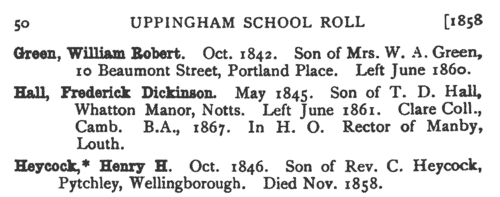
| Boys entering Uppingham School
(1900)
The public school at Uppingham in Rutland was founded by Archdeacon Johnson in 1584. A roll of scholars from 1824 to 1905 was edited by J. P. Graham, and published in 1906. This was a revision and updating of an 1894 edition of the roll, the great bulk of the work having been done by Mrs Mullins. The roll is arranged by year, and within each year by term of entrance, and then alphabetically by surname within each term. Each boy's name is given, surname first, with an asterisk where known (in 1906) to have died. Then there is month and year of birth, father's name (most often just surname and initials) and address (at entrance). Where the boy represented the school at Rugby football (XV) or cricket (XI), that is indicated. After the month and year of leaving the school, there is a brief summary of achievements in later life, and, where known, address as in 1906; but as late as this year, most boys were still at school and the entries are brief. From 1875 onwards the house within the school is also noted, with these abbreviations: A., Mr Constable's House; B., Brooklands; C., West Bank; E., Mr J. Gale Thring's House; F., Fircroft; Fgh., Farleigh; H., Highfield; L., The Lodge; L. H., Lorne House; M., Meadhurst; N., The Hall; R., Redgate; R. H., Red House; S., School House; and W. D., West Deyne. | Sample scan, click to enlarge
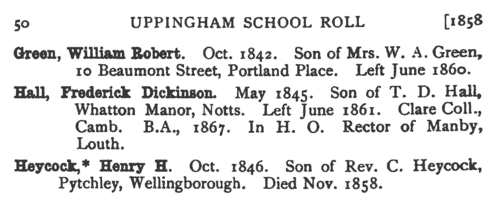
|  Outstanding soldiers of the Northamptonshire Regiment
(1881-1901) Outstanding soldiers of the Northamptonshire Regiment
(1881-1901)
Each year the best soldiers of the regiment were chosen for long service and good conduct medals. This register gives rank, name, regimental number, and date of recommendation. (The sample scan is from the East Surrey regiment). The register is essentially a register of recommendations, annotated with details of the issue of the medals. Where no gratuity accompanied the medal, the entry is marked 'W. G.' (without gratuity); where, for one reason or another, the medal was not issued, the entry is marked 'N. S.' (not sanctioned) and struck through. The regiment was based on the 48th Regimental District - Northampton. The 1st battalion returned from India to Ireland in 1880; was moved to England in 1885, and was based at Preston. It embarked for India 5 October 1892 and by 1895 was serving at Bangalore. The battalion fought in the North West Frontier campaign of 1897 to 1898. The 2nd battalion embarked for Natal 24 February 1879, and was based at the Cape of Good Hope by 1885. It took part in the Zulu and Boer wars, adding "South Africa, 1879" to the regimental honours. From there the battalion was sent to Hong Kong in 1885, and on to Singapore in 1888. It returned from Singapore to England 26 December 1892, and in 1895 was at Colchester. After having been on the Channel Islands from 1895 to 1897, the battalion was sent out from England to South Africa in 1899, gaining the honours "South Africa, 1899-1902" and "Modder River". | Sample scan, click to enlarge
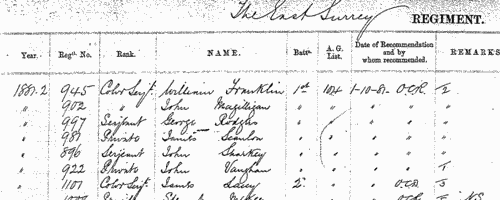
| Boys entering Uppingham School
(1901)
The public school at Uppingham in Rutland was founded by Archdeacon Johnson in 1584. A roll of scholars from 1824 to 1905 was edited by J. P. Graham, and published in 1906. This was a revision and updating of an 1894 edition of the roll, the great bulk of the work having been done by Mrs Mullins. The roll is arranged by year, and within each year by term of entrance, and then alphabetically by surname within each term. Each boy's name is given, surname first, with an asterisk where known (in 1906) to have died. Then there is month and year of birth, father's name (most often just surname and initials) and address (at entrance). Where the boy represented the school at Rugby football (XV) or cricket (XI), that is indicated. After the month and year of leaving the school, there is a brief summary of achievements in later life, and, where known, address as in 1906; but as late as this year, most boys were still at school and the entries are brief. From 1875 onwards the house within the school is also noted, with these abbreviations: A., Mr Constable's House; B., Brooklands; C., West Bank; E., Mr J. Gale Thring's House; F., Fircroft; Fgh., Farleigh; H., Highfield; L., The Lodge; L. H., Lorne House; M., Meadhurst; N., The Hall; R., Redgate; R. H., Red House; S., School House; and W. D., West Deyne. | Sample scan, click to enlarge
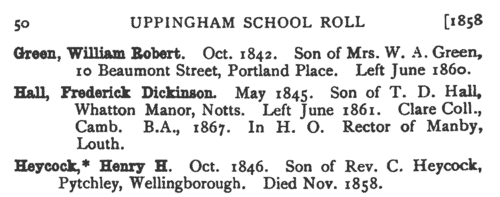
| Boys entering Uppingham School
(1905)
The public school at Uppingham in Rutland was founded by Archdeacon Johnson in 1584. A roll of scholars from 1824 to 1905 was edited by J. P. Graham, and published in 1906. This was a revision and updating of an 1894 edition of the roll, the great bulk of the work having been done by Mrs Mullins. The roll is arranged by year, and within each year by term of entrance, and then alphabetically by surname within each term. Each boy's name is given, surname first, with an asterisk where known (in 1906) to have died. Then there is month and year of birth, father's name (most often just surname and initials) and address (at entrance). Where the boy represented the school at Rugby football (XV) or cricket (XI), that is indicated. After the month and year of leaving the school, there is a brief summary of achievements in later life, and, where known, address as in 1906; but as late as this year, most boys were still at school and the entries are brief. From 1875 onwards the house within the school is also noted, with these abbreviations: A., Mr Constable's House; B., Brooklands; C., West Bank; E., Mr J. Gale Thring's House; F., Fircroft; Fgh., Farleigh; H., Highfield; L., The Lodge; L. H., Lorne House; M., Meadhurst; N., The Hall; R., Redgate; R. H., Red House; S., School House; and W. D., West Deyne. | Sample scan, click to enlarge
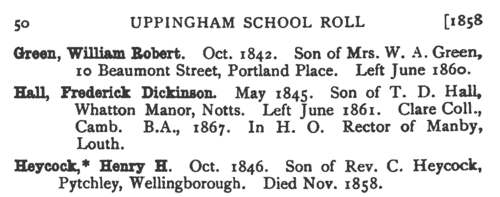
| The India Office
(1905)
The India List and India Office List was compiled from official records by direction of the Secretary of State for India in Council, and published by the India Office annually. It covers civil servants and military except for officers drawing substantive pay of less than 500 rupees a month. Names shown in italics are those of officers in foreign service, supernumerary, seconded or employed outside their own departments. This is the list for the Office of the Secretary of State for India in Council, including the Council, Correspondence Departments, Accountant-General's Department, Funds Department, Store Department, Registry and Record Department, Miscellaneous Appointments, India Audit Office, and Office Keepers and Messengers. | Sample scan, click to enlarge

| Violinists
(1905)
The calendar of the Trinity College of Music, London, for 1905-1906 includes a section listing violin associates and certificated violinists. At the end there are short lists of cellists, flautists, oboists and harpists. | Sample scan, click to enlarge

| Civil Servants and Office Holders
(1907)
The Imperial Calendar gives lists of officials and office-holders throughout England, Wales, Scotland and Ireland
| Sample scan, click to enlarge
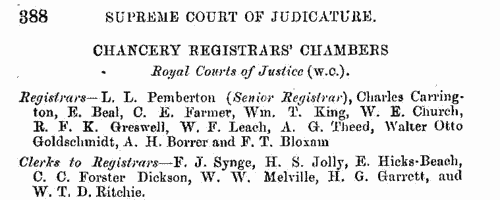
|
Research your ancestry, family history, genealogy and one-name study by direct access to original records and archives indexed by surname.
|












